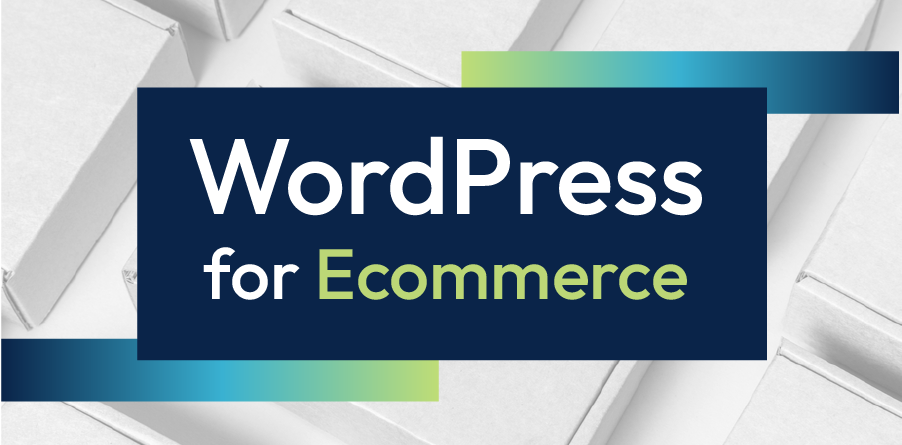WordPress for Ecommerce: Pros and Cons

WordPress is a popular CMS (content management system) for ecommerce and non-ecommerce websites. In fact, WP powers nearly 40% of the websites on the internet, commanding over 64% of the CMS market share.
However, WordPress is not the only good option for ecommerce websites anymore; in fact, we recently compared Shopify and Amazon, two incredibly popular selling platforms.
So, how does WordPress compare to its modern ecommerce counterparts, like Shopify? What are the pros and cons of WP for ecommerce?
We’ll explore these questions in the following content. Hopefully, we’ll help you narrow down the best ecommerce platform for your company.
A Brief History of WordPress for Ecommerce
As a CMS, WordPress was not originally designed for ecommerce websites. If a developer wants to utilize WP for an online store, WooCommerce must be downloaded. WooCommerce is a free, open-source, customizable WP plugin, used by over 5 million live websites. That amounts to over 30% of all online stores.
Needless to say, WooCommerce is widely used and accepted. However, this does not necessarily mean that WooCommerce, powered by WordPress, is right for your ecommerce business. Check out the pros and cons to determine if this WP plugin is the best option for you.
The Pros of WordPress for Ecommerce
WooCommerce is free and simple
That’s right. WooCommerce is free to download and easy-to-install. Website owners can download the plugin and create their digital storefront without much development expertise.
Dev.to provided a list of WooCommerce capabilities:
- Create eye-catching storefronts
- Optimize your pages for search engines
- Customize product pages
- Choose from multiple payment gateways
- Set your shipping options
- Calculate sales tax with ease
WooCommerce is customizable
Customization capability is a significant benefit of WooCommerce, as well as many ecommerce platforms. You can choose from over 1,200 ecommerce-focused WordPress themes and further customize these to fit your brand. Complex theme changes require development expertise.
Additionally, WordPress offers other plugins with various functionalities, including virtual product booking, upselling, and pre-ordering. WooCommerce Google Analytics provides website owners with extensive insight into customer actions, including product views.
WooCommerce offers multiple payment gateways
Multiple payment and shipment options expands your prospective customer base. WooCommerce’s payment extensions include WooCommerce Payments, Stripe, PayPal and PayPal Pro, Afterpay, Authorize.Net, Square, and Amazon Pay. Stripe and PayPal are bundled into the WooCommerce core and can be activated right away. Other extensions can be downloaded.
Additionally, WooCommerce can detect a customer’s location and display appropriate currencies, payment options, and tax rates.
WordPress offers good SEO-management tools
Yoast SEO is a popular WP plugin for search engine optimization. Yoast SEO allows web managers to easily optimize their metadata, analyze the overall SEO “score” of web pages, and make immediate changes.
The Cons of WordPress for Ecommerce
There are fees involved
No ecommerce platform is completely free. Though WooCommerce is free to download, WordPress websites must be hosted. Hosting costs differ, depending on your host. Bluehost, one popular hosting site, offers a range of options – from $9/month to $119/month. This pricing is fairly standard for WordPress hosting.
Beyond hosting fees, ecommerce platforms have credit card processing charges.
- WooCommerce Payments charge 2.9% + $0.30 per transaction made with a U.S. credit or debit card. Cards not issued in the U.S. require an additional 1% fee.
- PayPal offers the first $50,000 in transactions for free. After that, the charge is the same as WooCommerce Payments: 2.9% + $0.30 per transaction.
- Stripe charges 2.9% + $0.30 per transaction as well, if your yearly charges are below $1 million.
How does this compare to other ecommerce platforms, like Shopify? We explore how much Shopify costs in this blog post.
WordPress isn't primarily an ecommerce CMS
Although WP can serve as a suitable ecommerce platform, WP is not first-and-foremost designed for ecommerce websites. Because of this, you may be missing out on certain ecommerce functionalities that your storefront needs, despite numerous plugin options available. Ultimately, WooCommerce is not as robust as a CMS built for ecommerce websites, like Shopify.
Not all WooCommerce themes are trustworthy
As mentioned, WooCommerce features about 1,200 themes, paid and free. However, not all of these are trustworthy, so take care to find an ecommerce theme that is time-tested and has great reviews.
WordPress can have plugin issues
One of the most significant problems WordPress managers run into is plugin issues. For example, plugins are not always compatible with one another. Plugins can be unreliable and, frankly, sketchy, so pick and choose your downloads carefully.
What Are Your Other Options?
WordPress for ecommerce is a suitable option for some businesses, often small online shops. However, there are other highly-rated ecommerce CMS options, including:
- Shopify
- Wix eCommerce
- BigCommerce
- Squarespace
RivalMind: Ecommerce Developers
At RivalMind, we’re Shopify partners and design extensively in this platform. Because of this, we recommend Shopify to most ecommerce clients!
To learn more about the right ecommerce platform for your business, you can chat with a member of our team at (331) 228-9636, complete our online contact form, or start a conversation via the live chat icon on each of our website pages.
We look forward to hearing from you!

Meet the Author
Harley Helmer
Director of Search Marketing
Harley Helmer is a digital marketing professional with nearly a decade of experience in the industry. Today, he's the head of search marketing strategy at RivalMind, responsible for developing and executing comprehensive SEO campaigns that improve online visibility and boost organic traffic. His pragmatic, no-nonsense approach to marketing – paired with a robust knowledge base – helps him deliver innovative solutions to technical challenges and deliver real client success.
Specialties: SEO Strategy, Google Ads, and Search Marketing Opinions
Looking for more organic website traffic?
Welcome to RivalMind. Our purpose is to help your business thrive. We are a digital marketing agency that offers SEO, PPC, Web Design, Social Media and Video Solutions as tools to our clients for online business development and growth.
Contact us today to get started!
Blog Contact Form
Connect with Us:




